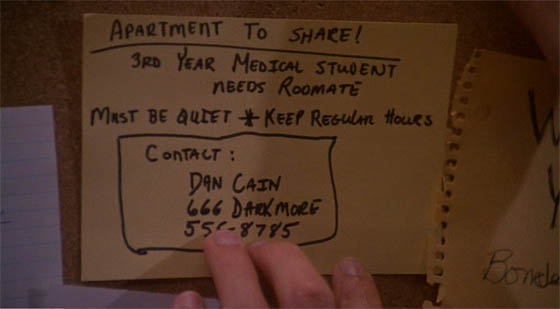 Until Guillermo del Toro finally convinces the studio suits to finance his dream project At the Mountains of Madness, cinema’s most reliably excellent adapter of the works of H.P. Lovecraft will remain Stuart Gordon. Gordon, a writer and director for the stage who founded Chicago’s Organic Theater Company, decided to make his transition into filmmaking with a low-budget horror film, aware that would be the easiest kind of film to sell; he chose for his source material Lovecraft’s “Herbert West, Re-Animator,” at the time one of the author’s most obscure stories, an episodic, Mary Shelley-inspired grotesquerie about a brilliant but amoral young man’s experiments with resurrecting the dead. Gordon’s Re-Animator (1985) was a boundary-pushing horror-comedy that became a hit at Cannes, and even Pauline Kael championed the film (“the bloodier it gets, the funnier it is. It’s like pop Buñuel; the jokes hit you in a subterranean comic zone that the surrealists’ pranks sometimes reached”). Unable to achieve an R-rating, the film was released unrated rather than submitting to cuts that might render it incoherent; like Dawn of the Dead (1978) before it, the lack of a rating only lent street cred, and Re-Animator became an instant horror hit. Gordon, a Lovecraft scholar, has returned to the author’s world time and again over the years: From Beyond (1986), Castle Freak (1995 – loosely adapted from the short story “The Outsider”), the Masters of Horror episode “Dreams in the Witch-House” for Showtime (2005), and – for my money, the finest Lovecraft film adaptation to date – Dagon (2001, based on “The Shadow Over Innsmouth”). Gordon understands the author backward and forward, and his films are riddled with references for the fans: characters wear Miskatonic University sweatshirts, and so forth. But he also adds his own particular aesthetic. Gordon, who says he grows faint at the sight of blood, explores his own phobias in all kinds of bloody ways; he knows how to make you cringe. He deliberately pokes at taboos, and every one of his horror films ventures into some uncomfortable psychosexual territory. He requires his actors to give it their all: scream, indulge in sadism or perversion, get naked and splattered with blood. It’s all in good fun, and he’s constantly defusing revulsion with humor. Some horror films leave you feeling worn out and depressed; Stuart Gordon’s films leave you laughing and exhilarated. He seems to be chasing catharsis.
Until Guillermo del Toro finally convinces the studio suits to finance his dream project At the Mountains of Madness, cinema’s most reliably excellent adapter of the works of H.P. Lovecraft will remain Stuart Gordon. Gordon, a writer and director for the stage who founded Chicago’s Organic Theater Company, decided to make his transition into filmmaking with a low-budget horror film, aware that would be the easiest kind of film to sell; he chose for his source material Lovecraft’s “Herbert West, Re-Animator,” at the time one of the author’s most obscure stories, an episodic, Mary Shelley-inspired grotesquerie about a brilliant but amoral young man’s experiments with resurrecting the dead. Gordon’s Re-Animator (1985) was a boundary-pushing horror-comedy that became a hit at Cannes, and even Pauline Kael championed the film (“the bloodier it gets, the funnier it is. It’s like pop Buñuel; the jokes hit you in a subterranean comic zone that the surrealists’ pranks sometimes reached”). Unable to achieve an R-rating, the film was released unrated rather than submitting to cuts that might render it incoherent; like Dawn of the Dead (1978) before it, the lack of a rating only lent street cred, and Re-Animator became an instant horror hit. Gordon, a Lovecraft scholar, has returned to the author’s world time and again over the years: From Beyond (1986), Castle Freak (1995 – loosely adapted from the short story “The Outsider”), the Masters of Horror episode “Dreams in the Witch-House” for Showtime (2005), and – for my money, the finest Lovecraft film adaptation to date – Dagon (2001, based on “The Shadow Over Innsmouth”). Gordon understands the author backward and forward, and his films are riddled with references for the fans: characters wear Miskatonic University sweatshirts, and so forth. But he also adds his own particular aesthetic. Gordon, who says he grows faint at the sight of blood, explores his own phobias in all kinds of bloody ways; he knows how to make you cringe. He deliberately pokes at taboos, and every one of his horror films ventures into some uncomfortable psychosexual territory. He requires his actors to give it their all: scream, indulge in sadism or perversion, get naked and splattered with blood. It’s all in good fun, and he’s constantly defusing revulsion with humor. Some horror films leave you feeling worn out and depressed; Stuart Gordon’s films leave you laughing and exhilarated. He seems to be chasing catharsis.
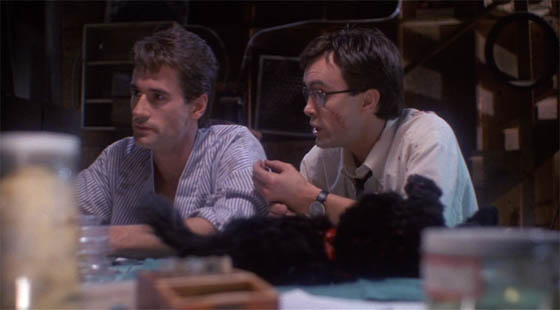 But enough about Stuart Gordon. One of the reasons Re-Animator has become a perennial favorite with horror fans is the cast, who work to sell every single line of the breathless, lunatic script (by Gordon and longtime collaborator Dennis Paoli). The star, of course, is Jeffrey Combs as Herbert West, the inventor of the re-animation formula which wreaks so much havoc in the film. In the years since, Combs has become typecast as the nerdy, tunnel-visioned genius. It takes a special sort to face off against an evil re-animated severed head with one-liners dripping with condescension: “Who’s going to believe a talking head? Get a job in a sideshow.” What makes Herbert West so wonderful is that he has no patience whatsoever for society’s moral code, nor for anyone around him unwilling to match the level of his brilliance, or at least assist him in his pursuit of discovery. He’s part Dr. Frankenstein, part Mark Zuckerberg. Perversely, his impatient demeanor becomes more appealing as the film progresses and the body count rises. West is not a mad scientist; he’s the only one level-headed enough to deal with the walking dead.
But enough about Stuart Gordon. One of the reasons Re-Animator has become a perennial favorite with horror fans is the cast, who work to sell every single line of the breathless, lunatic script (by Gordon and longtime collaborator Dennis Paoli). The star, of course, is Jeffrey Combs as Herbert West, the inventor of the re-animation formula which wreaks so much havoc in the film. In the years since, Combs has become typecast as the nerdy, tunnel-visioned genius. It takes a special sort to face off against an evil re-animated severed head with one-liners dripping with condescension: “Who’s going to believe a talking head? Get a job in a sideshow.” What makes Herbert West so wonderful is that he has no patience whatsoever for society’s moral code, nor for anyone around him unwilling to match the level of his brilliance, or at least assist him in his pursuit of discovery. He’s part Dr. Frankenstein, part Mark Zuckerberg. Perversely, his impatient demeanor becomes more appealing as the film progresses and the body count rises. West is not a mad scientist; he’s the only one level-headed enough to deal with the walking dead.
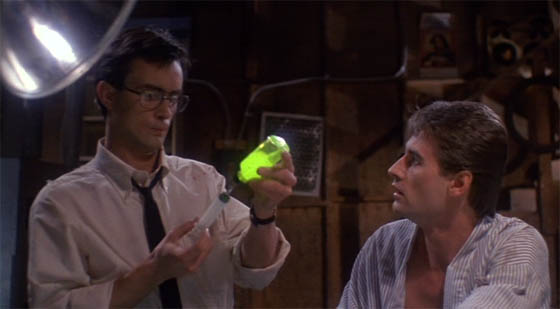 The audience surrogate is Dan Cain (Bruce Abbott), a handsome med student who happens to be dating the Dean’s daughter, Megan (Barbara Crampton, Chopping Mall). He reluctantly takes in Herbert West as a roommate, and his life spectacularly unravels when West sets up a lab in the basement and begins experiments in re-animation. First West brings Megan’s recently-deceased cat back to life, and in zombie form it nearly kills them both. In other words: success! So it’s time to raid the hospital for some fresh cadavers. A complication arises when Megan’s father (Robert Sampson) is killed by a zombie, and when Dr. Carl Hill (David Gale), who already has an unhealthy obsession with Megan, threatens to expose West’s experiments. Through all the bloody mayhem that ensues, and as his once-promising future falls apart before his eyes, Dan tries to suck it up and soldier on beside West.
The audience surrogate is Dan Cain (Bruce Abbott), a handsome med student who happens to be dating the Dean’s daughter, Megan (Barbara Crampton, Chopping Mall). He reluctantly takes in Herbert West as a roommate, and his life spectacularly unravels when West sets up a lab in the basement and begins experiments in re-animation. First West brings Megan’s recently-deceased cat back to life, and in zombie form it nearly kills them both. In other words: success! So it’s time to raid the hospital for some fresh cadavers. A complication arises when Megan’s father (Robert Sampson) is killed by a zombie, and when Dr. Carl Hill (David Gale), who already has an unhealthy obsession with Megan, threatens to expose West’s experiments. Through all the bloody mayhem that ensues, and as his once-promising future falls apart before his eyes, Dan tries to suck it up and soldier on beside West.
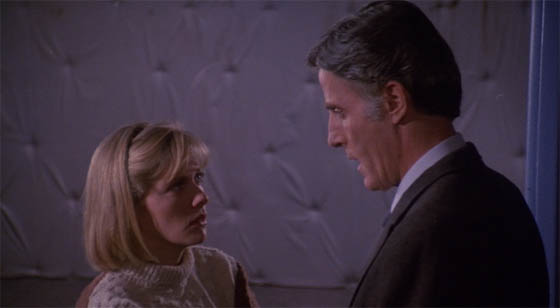 As Megan and the requisite damsel in distress, Barbara Crampton is heroic beyond belief. She took the part after the original actress dropped out due to the nature of the nude scenes (understandably). That Crampton plunges into the fire with gusto is pivotal to Stuart Gordon’s unflinching, grand guignol aesthetic. She participates in one of the most notorious moments in all of horror cinema, but it’s as hysterically funny as it is I-can’t-believe-it’s-going-there. She trusted Gordon’s instincts, and must have been pleased with the result, because she reunited with both Gordon and co-star Jeffrey Combs in From Beyond (playing a feminine twist on Herbert West) and Castle Freak (as Combs’ emotionally-damaged wife). In Re-Animator, part of the impact comes from the fact that Crampton has such a traditionally glamorous look that you simply don’t expect to see her dragged down through the blood and grime. But no character is left untouched by the film’s demented end.
As Megan and the requisite damsel in distress, Barbara Crampton is heroic beyond belief. She took the part after the original actress dropped out due to the nature of the nude scenes (understandably). That Crampton plunges into the fire with gusto is pivotal to Stuart Gordon’s unflinching, grand guignol aesthetic. She participates in one of the most notorious moments in all of horror cinema, but it’s as hysterically funny as it is I-can’t-believe-it’s-going-there. She trusted Gordon’s instincts, and must have been pleased with the result, because she reunited with both Gordon and co-star Jeffrey Combs in From Beyond (playing a feminine twist on Herbert West) and Castle Freak (as Combs’ emotionally-damaged wife). In Re-Animator, part of the impact comes from the fact that Crampton has such a traditionally glamorous look that you simply don’t expect to see her dragged down through the blood and grime. But no character is left untouched by the film’s demented end.
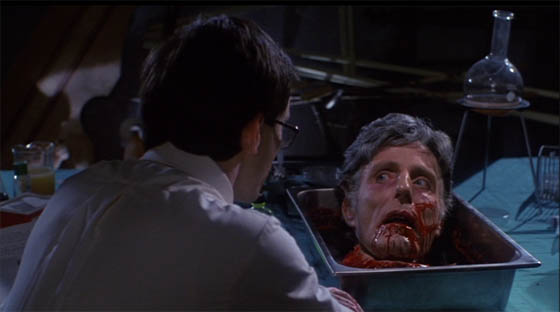 Re-Animator birthed two sequels (directed by Brian Yuzna). Arnold Schwarzenegger, whose Terminator stunt double appears in Re-Animator as a zombie, become one of the film’s earliest supporters, and offered to star in one of Gordon’s projects; the script that was produced, about a steroid-mutated killer, was not to his liking, but nevertheless he was instrumental in getting Gordon the job of directing Fortress (1992). (Christopher Lambert took the role once intended for Arnold.) Gordon’s films have gained a growing respect over the years for their fairly consistent quality and black humor; one of his most recent, the ripped-from-the-headlines thriller Stuck (2007), received rave reviews. But for some reason it’s still hard for him to get a project off the ground, and it’s a shame. (I want to see his long-in-development adaptation of Lovecraft’s “The Thing on the Doorstep.”) The fact that so many people wanted to see, for example, The Human Centipede, but so few actually enjoyed it, proves there’s still room for Gordon’s aesthetic on the big screen. He makes depraved, gross-out horror films that every well-adjusted adult can love.
Re-Animator birthed two sequels (directed by Brian Yuzna). Arnold Schwarzenegger, whose Terminator stunt double appears in Re-Animator as a zombie, become one of the film’s earliest supporters, and offered to star in one of Gordon’s projects; the script that was produced, about a steroid-mutated killer, was not to his liking, but nevertheless he was instrumental in getting Gordon the job of directing Fortress (1992). (Christopher Lambert took the role once intended for Arnold.) Gordon’s films have gained a growing respect over the years for their fairly consistent quality and black humor; one of his most recent, the ripped-from-the-headlines thriller Stuck (2007), received rave reviews. But for some reason it’s still hard for him to get a project off the ground, and it’s a shame. (I want to see his long-in-development adaptation of Lovecraft’s “The Thing on the Doorstep.”) The fact that so many people wanted to see, for example, The Human Centipede, but so few actually enjoyed it, proves there’s still room for Gordon’s aesthetic on the big screen. He makes depraved, gross-out horror films that every well-adjusted adult can love.









